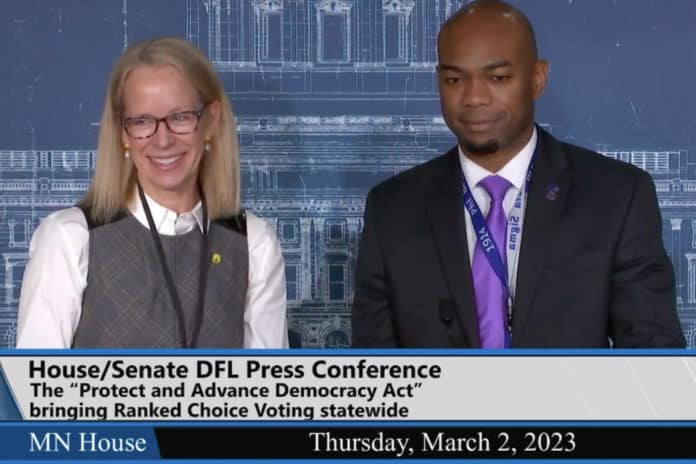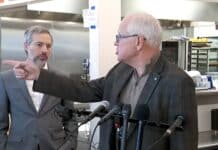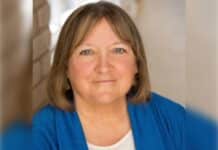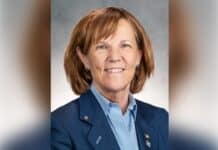
Despite the fact that few people attended a ranked choice voting press conference at the Minnesota Capitol on Thursday, DFL legislators and paid RCV advocates expressed enthusiasm about the prospect of passing a bill that would implement their favored system of determining representation in the legislature and for statewide office.
Sen. Kelly Morrison, DFL-Deephaven, and Rep. Cedrick Frazier, DFL-New Hope, have introduced a bill they’re calling the “Protect and Advance Democracy Act” that would make Minnesota a ranked choice voting state by 2026.
“I and a huge coalition of Minnesotans believe we need this bill,” Morrison said. “Ranked choice voting is the best step we can take to reduce extremism and political division.”
SF2270/HF2486 would implement the ranked choice voting system in all state legislature and statewide elections, and give local units of government the ability to pass their own laws and ordinances to enact ranked choice voting. It would also create a ranked choice voting implementation task force to help elections officials “on-ramp” the new system of voting and educate the populace on how RCV works in an election and what a RCV ballot looks like. Members of the task force would include representatives from several organizations that advocate for underrepresented minorities and civic organizations like the League of Women Voters, according to a provision in the bill.
The bill has been referred to elections committees in the House and Senate, but hearing dates haven’t been scheduled.
The ranked choice voting movement in Minnesota has been pushed for the last several years by FairVote Minnesota, which raised nearly $1 million in 2020 for campaigning and outreach activities to promote RCV. Its executive compensation expenses have tripled over the last four years. Some of FairVote Minnesota’s prominent donors include Kathryn Murdoch, daughter-in-law to media mogul Rupert Murdoch.
Democrat pollster with Walz ties says Minnesotans favor RCV
While FairVote Minnesota executive director Jeanne Massey said that a newly-released poll of Minnesotans shows that 64 percent are in favor of implementing ranked choice voting statewide, she failed to mention that top staff for the pollster, Expedition Strategies, are former campaign staff members for prominent DFL politicians, like former U.S. Senator Al Franken and Gov. Tim Walz. Just last year, Walz publicly endorsed ranked choice voting.
Expedition Strategies lists the Walz campaign as one of its clients and received $30,000 from the Minnesota DFL Party in late 2021.
While more than three dozen DFL legislators signed on to the bill in the House, just four DFLers are listed as co-sponsors in the Senate (where the DFL has a one-vote majority).
Republicans in the Senate blasted the proposed legislation, saying that ranked choice voting undermines trust in the election process and is a solution in search of a problem.
“Our election system has worked for generations ensuring every vote cast for a candidate is included in the final vote in a simple and fair counting of the ballots,” said Sen. Mark Koran, R-North Branch. “Ranked Choice Voting removes the assurance and transparency we have come to expect from our elections. Valid ballots may cease to be counted based on who they voted for during the various cycles of counting, and that’s not fair to those voters.”
Recent elections by RCV in Minnesota haven’t really changed candidate quality or reduced negative campaigning like the advocates say it would, said Koran, who serves as the top-ranked Republican on the Senate Elections Committee. “RCV is more likely to provide a winner who earned less than a majority of votes, and everybody’s third choice may not be the best choice.”
The Foundation for Government Accountability, a vocal opponent of ranked choice voting, says the system is a “disaster in disguise,” because it “ needlessly complicates the voting system, leading to voter confusion, lower turnout, and slower election results.”
Hank Long
Hank Long is a journalism and communications professional whose writing career includes coverage of the Minnesota legislature, city and county governments and the commercial real estate industry. Hank received his undergraduate degree at the University of Minnesota, where he studied journalism, and his law degree at the University of St. Thomas. The Minnesota native lives in the Twin Cities with his wife and four children. His dream is to be around when the Vikings win the Super Bowl.








